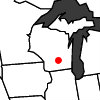
De Forest, WI | Flood irrigation is probably the LEAST efficient method of irrigating. Unless your raising rice or some other crop that needs a flooded field, then switching to a more water efficient method would be very beneficial. Most of the farms that raise veggies and some row crops have switched to SDI (Subsurface drip irrigation.) This is the most efficient method of irrigating currently in use. Essentially drip tubes are placed 8-10 inches (sometimes more) beneath the surface. Water is then supplied as the crop needs it. Water moves towards the surface through percolation as the irrigation runs. Irrigation is terminated when water approaches 1-2 inches from the surface. This prevents almost all evaporation and results in a near 100% water use efficiency. A subsurface drip irrigation system, when properly managed, can last many decades. It does not have corners that need to be covered as in a pivot.
As to working land that is on a grade that can cause erosion, that is always a management decision. Terracing and other methods can be used to reduce or prevent runoff. Arguing for 100% no-till and reliance on chemicals is not automatically the most sustainable either. It depends on the cropping methods and other related farm practices. Manure in many parts of the country is required to be injected or incorporated to prevent runoff. In my area of the country most dairies are spreading manure on top and then incorporating it. Some also have a fall cover crop in place.
Be careful when painting with a broad brush. Sustainable practices does not automatically mean no-till.
As for organic yield be half of conventional neighbors, then I would have to say that organic production was not your forte. Most of the organic farms in this neck of the woods can yield similar and sometimes more than their conventional competition. Nutrients are not hard to figure out. Using turkey litter is pretty easy (Spread it on and your done). Using the correct amount is also not rocket science. Supplying nitrogen is not hard either (Plant hairy vetch, peas, clover and rye after late spring/summer broccoli and your nitrogen needs for next years sweet corn crop is met. The process in organic is different. Unless you grow up with it, have good producers to learn from or are technical person who likes to read then it may be a difficult transition. Most row crop farmers can't just switch without understand the differences in the system. It also may not work as well if there isn't access to manure/litter, etc. in your growing area at an affordable price.
Trying to imply organic can't feed the planet is a canard. When done properly with modern hybrids yields are similar or better than conventional. Organic production however requires more management. That may mean less acres covered by one producer for the same yield. That doesn't mean the process can't feed a lot of people, it just means we need more people involved in agriculture. |


 More on European GMO conclusions.
More on European GMO conclusions.